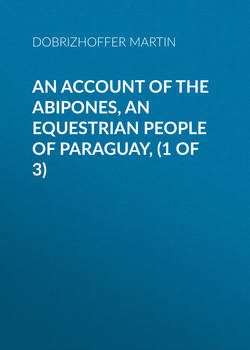Читать книгу An Account of the Abipones, an Equestrian People of Paraguay, (1 of 3) - Dobrizhoffer Martin - Страница 1
PREFACE
ОглавлениеMartin Dobrizhoffer was born at Gratz in Styria, on the 7th of September, 1717. In the year 1736, he entered the order of the Jesuits; and in 1749 went as a Missionary to South America, where for eighteen years he discharged the duties of his office, first in the Guarany Reductions, latterly in a more painful and arduous mission among the Abipones, a tribe not yet reclaimed from the superstitions and manners of savage life. Upon the expulsion of the Jesuits from Spanish America, he returned to his native country, and, after the unjust and impolitic extinction of his order, continued to reside at Vienna till his death, which took place July 17, 1791. The Empress Maria Theresa used frequently to send for Dobrizhoffer, that she might hear his adventures from his own lips; and she is said to have taken great pleasure in his cheerful and animated conversation.
These notices concerning him have been obtained from one of the last survivors of his celebrated order.
In 1784, he published the work, a translation of which is now laid before the public. The original title is Historia de Abiponibus, Equestri, Bellicosaque Paraquariæ Natione, locupletata copiosis Barbararum Gentium, Urbium, Fluminum, Ferarum, Amphibiorum, Insectorum, Serpentium præcipuorum, Piscium, Avium, Arborum, Plantarun, aliarumque ejusdem Provinciæ Proprietatum Observationibus; Authore Martino Dobrizhoffer, Presbytero, et per Annos duodeviginti Paraquariæ Missionario. A German translation, by Professor Kreil of the University of Pest, was published at Vienna in the same year. There is no other work which contains so full, so faithful, and so lively an account of the South American tribes.
His motives for undertaking the work, and his apology for the manner in which it is executed, may best be given in his own words: —
"In America, I was often interrogated respecting Europe; in Austria, on my return to it, after an absence of eighteen years, I have been frequently questioned concerning America. To relieve others from the trouble of inquiring, myself from that of answering inquiries, at the advice of some persons of distinction, I have applied my mind to writing this little history; an undertaking which, I am aware, will be attended with doubtful success and infinite vexation, in this age, so abundant in Aristarchi, accustomed to commend none but their own, or their friends' productions, and to contemn, as abortive, those of all other persons."
"A seven years' residence in the four colonies of the Abipones has afforded me opportunities of closely observing their manners, customs, superstitions, military discipline, slaughters inflicted and received, political and economical regulations, together with the vicissitudes of the recent colonies; all which I have described with greater fidelity than elegance, and for the want of this I am surely to be pardoned; for who can expect the graces of Livy, Sallust, Cæsar, Strada, or Maffeus, from one who, for so many years, has had no commerce with the muses, no access to classical literature? Yet in writing of savages, I have taken especial care that no barbarisms should creep into my language. If my sincerity be only acknowledged, I shall have attained my object: for candour was always the most noble ornament of an historian. To record true, and as far as possible well-established facts, has been my chief aim. When you read, I do not ask you to praise or admire, but to believe me; that I think I may justly demand."
"What I have learnt amongst the Paraguayrians in the course of eighteen years, what I have myself beheld in the colonies of the Indians and Spaniards, in frequent and long journeys through woods, mountains, plains, and vast rivers, I have set forth, if not in an eloquent and brilliant narration, certainly in a candid and accurate one, which is at least deserving of credit. Yet I do not look upon myself as a person incapable of making a mistake, and unwilling to be corrected. Convince me of error and I shall yield, and become as pliable as wax. Yet I advise you to proceed with caution; for you may err in judging as well as I in writing. So far am I from deeming this little work of mine perfect, that before it is printed and published, I intend to correct and polish it. But as I am now fast approaching my six-and-sixtieth year, I dare no longer defer the publication, lest the work should prove a posthumous one. These premises I have thought proper to make. Adieu! friendly reader, whoever you are; and pardon the errors of the press, and of the author likewise: for, Nihil humanum a me alienum puto."
In the course of the work, Dobrizhoffer frequently takes occasion to refute and expose the erroneous statements of other writers respecting the Jesuits in Paraguay, and the malignant calumnies by which the ruin of their institutions in that country was so unhappily effected. It has been deemed advisable to omit many of these controversial parts, which, though flowing naturally from one who had been an active member of that injured society, must of course be uninteresting in this country, and at these times. In other parts also, the prolixity of an old man, loving to expatiate upon the pursuits and occupations of his best years, has been occasionally compressed. No other liberty has been taken with the translation. The force and liveliness and peculiarity of the original must of necessity lose much, even in the most faithful version. Yet it is hoped, that under this inevitable disadvantage, Dobrizhoffer will still be found one of those authors with whom the reader seems to become personally familiar.
